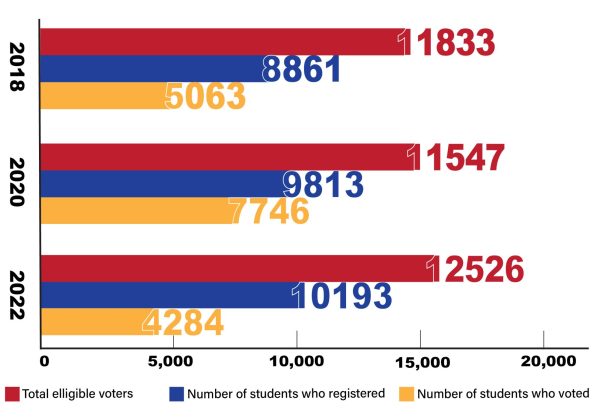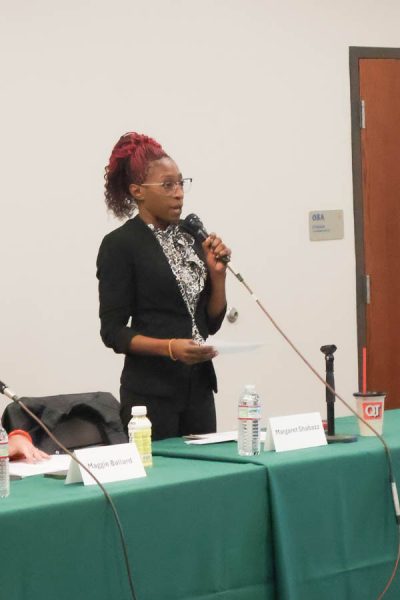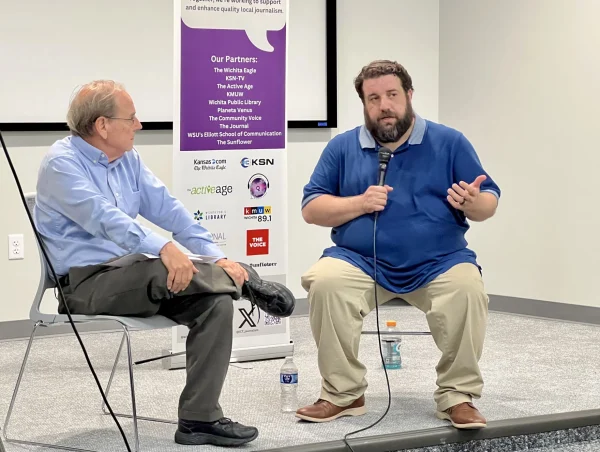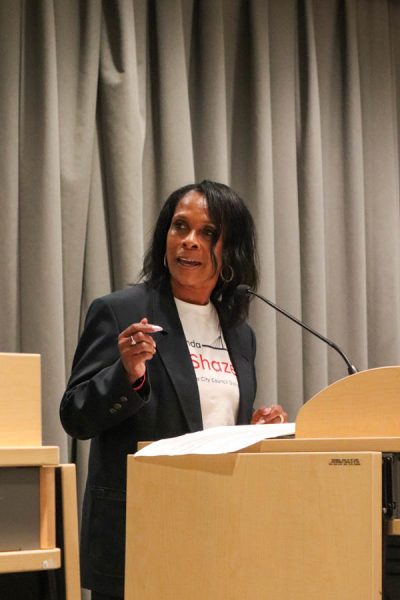COVID-19 affecting 20-44-year-olds at high rates in Kansas
Students walk across campus before it closed for the semester because of COVID-19. Campus, county, and state officials warn that the population of 20 to 44-year-olds are at higher risk for catching and spreading the virus than they may think.
COVID-19 cases in Kansas are particularly high right now in the 20-44-year-old age group, according to the Kansas Department of Health and Environment Coronavirus Disease 2019 (COVID-19) Case Summary report update on Thursday. At the time of the report, 160 of the state’s 552 active COVID-19 cases fell within the 20-44-year-old range.
Though the number of cases rose from 552 to 620 in the last 24 hours, the rate of spread remains roughly 30% for 20-44-year-olds.
There have been 151 hospitalizations and 17 deaths in the state of Kansas thus far.
After Johnson County (171 cases) and Wyandotte County (131 cases), Sedgwick County has the most cases in the state with 85. Ten people in Sedgwick County have recovered and one person has died from COVID-19.

A case is defined as a person who tested positive for the novel coronavirus (SARS CoV-2) which causes Coronavirus Disease 2019 (COVID-19). This data is from April 2.
What does it mean?
Trying to compare the data to national trends is tough right now, said Camille Childers, Wichita State’s director of student health services.
“We have so many cases nationwide, but they’re not really breaking it down by age anymore. That’s hard to find,” Childers said.
She said the trend of higher rates of infection in the young adult population has been documented before.
“This is actually not the first time that’s been noted,” she said.
When the CDC released its Morbidity and Mortality report several weeks ago, the high rates in the under-50 age group were also marked.
“We were looking at that and the phenomenon of that age group having a higher percentage of active cases was identified then,” Childers said. “It’s not like that’s new and unique to Kansas — that’s occurred from other U.S. infections as well.”
Childers underscored the importance of social distancing to battle the spread.
“The reality is that that’s one of the major tools in our toolbox to fight this outbreak is social distancing,” she said. “Some data is coming out that says you may be contagious before you have symptoms. So, the issue with social distancing has to do not only with protecting yourself, but it could be that you’ve been exposed and you’re asymptomatic, and you’re contagious but you don’t know it. You may be spreading it to others without your knowledge.”
When asked if the data suggests Kansas is simply testing more people or if it means 20- to 44-year-olds are actually getting infected at a higher rate, Childers said she thought it could be a little of both.
She said more testing has been done in the last 10 days.
“More of it is being done at private labs, so there are opportunities there for more places to be tested,” Childers said. “You obviously are going to have more testing opportunities.”
On Friday, Secretary of the Kansas Department of Health and Environment Lee Norman said there’s increasing evidence that the 25- to 35-year-old population could have people in it who are positive, asymptomatic, and spreading the virus. Norman said 20- to 44-year-olds are not as likely to be symptomatic.
He also said they are more likely to continue daily activities because they don’t feel like they are as vulnerable to COVID-19 as older populations.
Kate Flavin, the Sedgwick County public information officer, said these trends underscore the importance of people taking COVID-19 seriously and following the state and county orders to stay home and socially distance themselves.
“Anyone can get COVID-19,” Flavin said. “There are various severities of it and no one is immune right now, so it’s important for all of us to, you know, stay home — especially stay home if you are ill.
“Follow the governor’s orders, follow the CDC recommendations for social distancing — you know, keep six feet away from you and anyone else, cover your coughs and sneezes, and to remember to wash your hands frequently with soap and water.”
What to do if you’re not feeling well
Childers said if you’re a student and you’re sick, the first thing to do is to call Student Health Services.
“We’re open 8 a.m. to 5 p.m. Monday through Friday. We still have appointments available every day for people to come in, but because of COVID, if people are sick, we’d like to talk to them first,” Childers said.
Students can call 316-978-4792 and say that they would like to be seen if they aren’t feeling well.
“We’ll get you connected to a health professional and ask some questions,” Childers said. “Some of it may be related to travel or may be related to your symptoms — how long you had it if you’ve been exposed to anybody. It’s kind of determining whether or not you need to come in and be seen. And then if that determination is made, you can come into the clinic and be seen by one of the nurse practitioners.”
Student Health Services isn’t equipped to test for COVID-19. If it comes out to the point where health services believe you may have COVID-19, it’s up to the health department to decide whether or not you’ll be tested.

Audrey Korte was a reporter and the opinion editor for The Sunflower. She hosted The Sunflower News Podcast.













